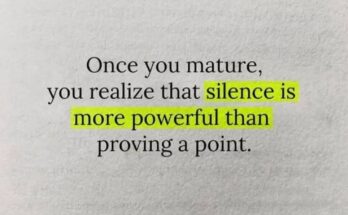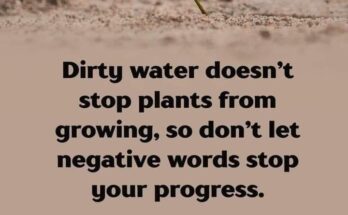
Nature has a way of teaching us lessons in the most subtle yet profound ways. Consider a plant growing in the wild. It does not always receive clear, fresh water. Sometimes, it must rely on rain mixed with mud, or groundwater that’s far from pristine. And yet, it grows. Its roots push through the soil, drawing nutrients from wherever it can. The leaves turn toward the sun, seeking light even in stormy weather. The plant does not stop simply because the water isn’t perfect. It adapts, persists, and blooms regardless of the conditions.
Likewise, our lives are rarely nourished by pure encouragement alone. More often than not, we face criticism, doubt, and negative words from others—whether it be family, friends, colleagues, or even strangers. These words, like dirty water, are part of the environment. But we, like the plant, have a choice: will we stop growing because the conditions are less than ideal? Or will we push through, grow stronger, and prove that even in the mud, beauty can rise?
This essay explores the idea that negative words, like dirty water, don’t define our potential. They are obstacles, not dead ends. By examining the nature of human growth, the psychology of negativity, and the power of resilience, we’ll see how personal progress is not only possible in difficult circumstances—it is often because of them that we become who we are meant to be.
The Power of Words: How Negativity Affects Us
Words are not just sounds or letters strung together—they are carriers of emotion, intention, and meaning. When spoken with love, they can heal. When laced with anger or judgment, they can wound. Most of us can recall a moment from childhood or adolescence when someone said something cruel, dismissive, or mocking. That moment, though perhaps fleeting for the speaker, may have carved itself into our memory, shaping how we see ourselves and what we believe we can become.
Negative words are like invisible chains. They don’t leave physical marks, but their effects can linger for years. “You’re not good enough.” “You’ll never make it.” “Why bother trying?” These phrases can settle into the subconscious, quietly influencing our confidence, decisions, and dreams. They create an internal narrative that plays on repeat, especially when we are vulnerable, tired, or uncertain. And over time, if left unchecked, that narrative becomes a barrier—a self-fulfilling prophecy rooted not in truth, but in fear and falsehood.
What makes negative words especially dangerous is that they often come from people we trust. A disapproving parent, a competitive sibling, a toxic friend, or even a teacher who underestimates us—these voices carry weight. When criticism comes from within our circle of influence, it’s harder to dismiss. We absorb it, question ourselves, and sometimes internalize it as fact.
But here’s the truth: words only have as much power as we allow them to have. While we cannot control what others say, we can control how deeply we let their words penetrate our hearts. Just as a plant may receive dirty water but still choose to thrive, we too can decide not to allow toxic words to define our worth or limit our growth.
The key lies in awareness. We must become conscious of the words we’ve accepted as truth—especially the ones that echo in our inner dialogue. Are they rooted in love and support, or are they tainted by someone else’s fear, insecurity, or projection? Once we recognize that many of these voices are not our own, we begin the process of reclaiming our narrative. And that is where growth begins.


